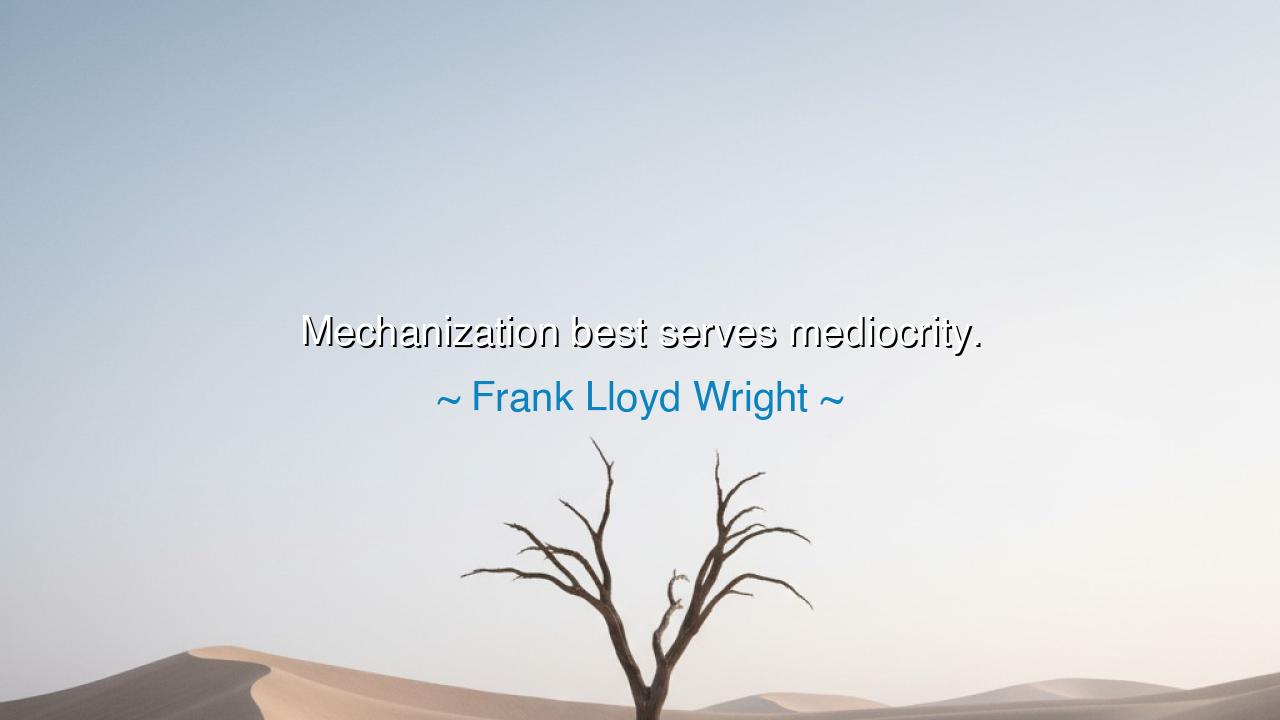
Mechanization best serves mediocrity.






When Frank Lloyd Wright, the great architect of organic vision, spoke the words, “Mechanization best serves mediocrity,” he cast a warning to the ages. He did not curse the machine, nor deny its strength, but rather lamented the spirit that bows too quickly before it. For the machine, mighty though it is, can carry a soul upward or drag it downward. When men place their trust wholly in mechanization, they risk becoming shadows of themselves, losing the divine fire of creativity that sets humanity apart from stone and steel.
In these words lies the ancient struggle between artistry and automation. Wright, who shaped buildings that breathed with the land, saw that when men surrender to mechanization without vision, they produce works that are uniform, lifeless, and empty of spirit. The machine excels at repetition; it delights in sameness. And thus, it becomes a servant not of greatness, but of the mediocre, who seek comfort in easy patterns and reject the labor of imagination. True genius demands imperfection, struggle, and the human touch, which no device can replicate.
Consider the tale of the Industrial Revolution. Great factories rose with their iron skeletons and ceaseless pistons. From them poured endless goods—shirts, chairs, utensils, all alike, all uniform, all stripped of uniqueness. These goods fed the many but starved the soul. Where once a craftsman carved a chair that carried his signature in every curve, now a machine stamped out thousands, soulless and cold. Society gained efficiency but lost intimacy. The mediocrity was served, for the spirit of art was sacrificed upon the altar of speed.
And yet, the machine itself is not evil. It is a tool, a chisel in the hands of destiny. Michelangelo used simple chisels to free David from the marble. Wright himself embraced technology when it bowed to the vision of harmony with nature. But his warning was this: when mechanization becomes master, it enslaves the soul; when it becomes servant, it can amplify genius. The danger lies not in the tool, but in the spirit of the user.
We see this truth again in our own age. The rise of digital creation has given us templates, filters, and programs that can conjure works in seconds. But when the unwise lean wholly on these, their creations lack fire. A photograph with no vision is but an image. A building raised by formulas and algorithms may stand tall, yet it does not breathe. Mechanization can produce a million things, but only the heart can produce meaning. Thus, it serves mediocrity best, unless guided by hands of greatness.
O children of tomorrow, take this lesson to heart. Do not let the machine replace your soul. Use its strength, yes, but do not let its ease dull your edge. The sword of the spirit is sharpened through struggle, not through shortcuts. Greatness requires that you infuse your craft with vision, with individuality, with courage to defy the uniform. If you surrender all to the machine, you will gain comfort but lose glory.
The path, therefore, is balance. Welcome mechanization as servant, but never as master. Shape it with your imagination, guide it with your values, let it extend your reach but never define your soul. Seek to create not what is easy, but what is enduring. The mediocre will settle for what the machine produces; the great will demand that it serve a higher purpose.
So remember Wright’s warning: “Mechanization best serves mediocrity.” Let it ignite in you the resolve to rise above the ordinary. Take up the tools of your time, but wield them with artistry, courage, and vision. In this way, you shall not become a servant of mediocrity, but a maker of greatness, leaving behind works that breathe long after the machines are silent.






AAdministratorAdministrator
Welcome, honored guests. Please leave a comment, we will respond soon